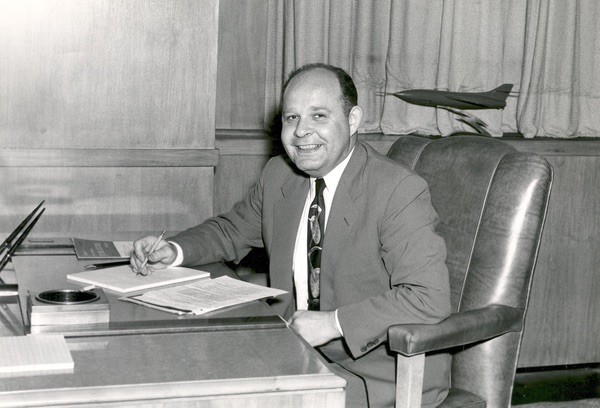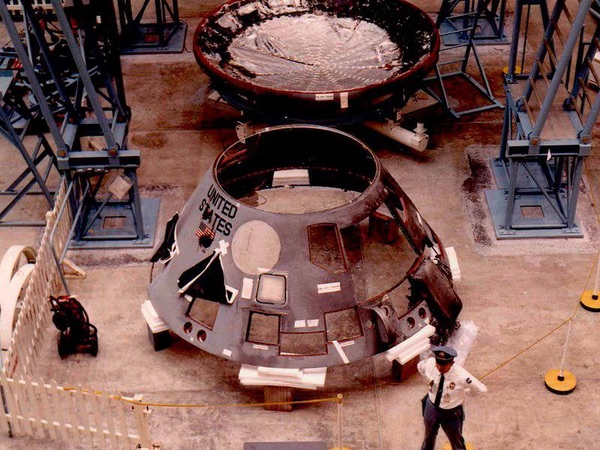Rashomon’s fire: another perspective on Apollo 1 from NASA official Paul Demblingby Dwayne A. Day
|
| Dembling’s experience is another facet of the story, and like the famous Akira Kurosawa movie Rashomon, it demonstrates that even stories told by different people about the same event can look different, and even contradictory, and the sum of the parts may still not add up to a coherent whole. |
Near the end of the Senate hearing, a junior senator, Walter Mondale, confronted NASA Administrator James Webb about an internal NASA report produced over a year earlier that had blasted Apollo contractor North American Aviation for shoddy workmanship. (See “When Senator Walter Mondale went to the Moon: the Apollo 1 fire and the myths we create,” The Space Review, March 16, 2020.) Webb expressed no knowledge of the report, but Deputy Administrator Robert Seamans suggested that there could have been documentation of that kind. This led to Seamans being chewed out by Webb during the car trip back to NASA Headquarters. (See “Capsule on fire: An interview with Robert Seamans about the Apollo 1 fire,” The Space Review, March 23, 2020.)
But if Dembling had not been so rushed to get up to Capitol Hill for the hearing, he might have defused the incident and saved NASA tremendous embarrassment in front of Congress and the press.
In 1999, in honor of the 30th anniversary of the Apollo 11 landing, radio station WAMU in Washington, DC, aired a program about the role of Washington politics in the lunar landing. “Washington Goes to the Moon” was written and produced by Richard Paul and featured interviews with a number of key figures in the story, including Dembling. After the radio program aired, Richard Paul, the author of We Could Not Fail: The First African Americans in the Space Program, turned transcripts of the interviews over to NASA as historical documents. These transcripts include unaired portions of the interviews.
Dembling, who died in 2011 at the age of 91, had played a major role in the creation of NASA in the late 1950s. As general counsel to the National Advisory Committee for Aeronautics (NACA) in 1958, Dembling had helped shape the agency’s legislative charter, the National Aeronautics and Space Act, something that he later said was his proudest achievement. This 1999 interview, conducted by producer Richard Paul, is reproduced below with limited editing for clarity. It has never been published before.
 Paul Dembling. (credit: NASA) |
Richard Paul: What were you expecting when you walked into that hearing?
Paul Dembling: Since we’d had a series of hearings on the subject of the fire, we were expecting more of the same. Except that it was over on the Senate side and we were expecting pretty much the same bunch of questions that we’d had before.
Richard Paul: You had done your own, internal investigation, right?
| “Going back in the car, the administrator was asking: ‘What was he getting at? He must have some kind of a report there.’” |
Dembling: That’s right. We’d had a very extensive investigation of not only the causes of the fire, but also what should we be doing to correct anything that might be dangerous in the capsule. Such things as recognizing that Velcro—which was used in order to put something on the walls because you’re in zero-gravity environment—we would have something which would be used to that purpose. We found that Velcro was very flammable and just spread very quickly. So that was one thing that was not going to be used in the future. Things of that sort. Not only the causes, but also what should be done to correct anything that we’d found
Richard Paul: Tell this story about what happened the morning of the hearing.
Dembling: Well, the morning of the hearing, we had prepared to go up to the Hill. We had a certain number of briefing books that we had gone over. At the last minute, as I was walking out—and I tell you this because this becomes a part of the story—as I was going out, General Sam Phillips’s assistant came in and said, “I have some documents here that I would like you to take a look at. I recognize you’re on your way out, but when you get back, maybe we can talk about ’em.” [Phillips was then an Air Force general on loan to NASA as Apollo Program Director.]
Richard Paul: That turned out to be a bad mistake. Tell that story.
Dembling: That was critical later on during the hearing.
Richard Paul: He says that to you, and you said...
Dembling: I said, “OK, I’ll take a look at it when I get back, I don’t have time now. I’m packing up. I’m leaving.” It was maybe 2–3 minutes before I had to meet the Administrator, Jim Webb, to go up to the Hill.
Richard Paul: So, the hearing is going on, Mondale is asking all these questions about the so-called “Phillips report.” And what happened right afterward? I guess you guys walked out into the hallway?
Dembling: Senator Mondale kept questioning about a so-called "Phillips report.” George Mueller [head of the Office of Manned Space Flight] was there, but Sam Phillips was not. And Jim Webb had no idea what he was talking about. And so he looked over to Mueller and Mueller didn’t know what he was really talking about. And so that’s what Jim Webb told ’em. He said, “I don’t know what, what you’re talking about.”
| I get back in my office and I pick up what his assistant had left with me, and clearly it’s what Mondale was talking about. It’s labeled—only typed on it—but it’s labeled, ‘The Phillips Report.’” |
Going back in the car, the administrator was asking: “What was he getting at? He must have some kind of a report there.” Well at that time, Mueller says, “Well, you know we’ve been running a whole bunch of Tiger Team reports. But nothing that’s called ‘The Phillips Report.’” A Tiger Team situation is where there’s a problem that develops in an installation, or a contractor’s workplace, and the agency sends out a group of specialists who know that work very well to look and see what the problem is, how to solve the problem and come up with solutions, and maybe how to come up with a solution in the future. So that’s a Tiger Team, and they usually write a report as to what happened and what they recommend and how you go forward with something of that nature.
Richard Paul: So, you get back to the office…
Dembling: I get back in my office and I pick up what his assistant had left with me, and clearly it’s what Mondale was talking about. It’s labeled—only typed on it—but it’s labeled, “The Phillips Report.” But what it is, it’s a series of reports that are made by these so-called Tiger Teams that somebody just took ’em and put ’em all together in an Alcove Fastener binder kind of thing. Nothing published, nothing printed or anything. Just for ease of handling. But it is labeled “Phillips Report.”
So I recognized that this must be what Mondale was talking about, wondering how he had a copy, because there were probably only three or four copies around, and I go rushing down to the administrator’s office. Jim Webb’s comment was, I knew he had something otherwise he wouldn’t have been persistent. And he asked for George Mueller and Sam Phillips to come to his office. (laughs) He said “Get me those guys. And get ’em the hell up here real fast.”
Jim Webb did not like to be accused. He felt like he always worked with the Congress and the Senate and the Hill. He had very good relations with them. He never wanted to be put in a position where he looked like he was obstructing what they were seeking, or not giving them full information. That kind of thing.
Richard Paul: What was Webb like when he got mad? Are there any stories about famous blow-ups?
Dembling: Well he was quite perturbed. He got red in the face and he was fuming, but he didn’t holler or cuss or anything. But you could tell it was boiling up inside of him. That was all.
Richard Paul: He was really furious though?
Dembling: He was furious.
Richard Paul: That he’d been blind-sided on this?
| By then the damage had been done. The NASA administrator had testified in Congress that he didn’t know something major about the program that had just killed three American heroes. |
Dembling: Well that’s right. He thought that somebody knew something they hadn’t told him. Of course, the logical question is: what happened next when they got to the office? Sam Phillips said, “I never referred to this as ‘The Philips Report.’ Yes, it’s put together, but somebody must have put that together. These are individual reports of problems and individual solutions.”
By then the damage had been done. The NASA administrator had testified in Congress that he didn’t know something major about the program that had just killed three American heroes. If Dembling had only picked up the file and taken it with him to the hearing, things might have gone a lot differently.
“Washington Goes to the Moon” was sponsored in part by the National Science Foundation, NASA, WAMU FM, WABE FM, and the Morehouse School of Medicine. You can listen to parts 1 and 2 for free here.
Note: we are temporarily moderating all comments submitted to deal with a surge in spam.
